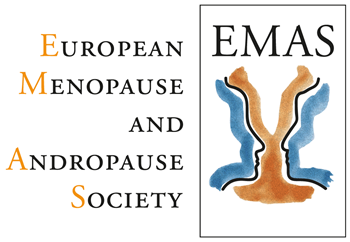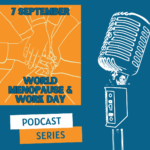Intro: Vasomotor symptoms and vaginal dryness are the most common symptoms of the menopause. While the menopause may cause no significant problems for some, for others, symptoms present considerable difficulties in their working and personal lives.
Understanding how menopause impacts various aspects of health is crucial for creating a supportive workplace.
This podcast episode, brought to you by the European Menopause and Andropause Society (EMAS), features Dr Dorenda van Djiken discussing the most common menopause symptoms and how they can affect both personal and work life. Let’s dive into today’s discussion.
Dr Dorenda van Djiken: In this recording, we will discuss menopausal symptoms. Menopausal transition is the period around the last menstrual period, which is called menopause. The natural age at which menopause can occur is between 40 and 60 years of age. In 1% of all women it is under the age of 40, which is called Premature Ovarian Insufficiency (POI). In this recording, we will only discuss the natural or physiological transition.
The average age at which menopausal transitions develop is between 45 and 47 years. The average age of menopause is 51 years. Menopausal symptoms can last two to ten years and even longer in a very small group of women. Severe symptoms are more common in women who smoke or who are obese. Menopause can also be caused by surgery or by treatment, such as cancer. Often the symptoms are then even more severe.
The most common complaints are the vasomotor complaints, also known as hot flashes. If they occur at night, we speak of night sweats. Sometimes women have one or the other, but usually both. 85% of women experience these symptoms to a greater or lesser extent. In the end, it is the woman herself who decides how annoying it is for her. A hot flash is a sudden onset of heat, often with perspiration, that originates between the breasts and rises to the neck and head. On average, a hot flash lasts three to five minutes, but during the menopause, there can also be other complaints such as mood swings, poor sleep, brain fog, muscle and joint discomfort, and menstrual complaints such as heavy blood loss. But also palpitations, headaches or restless and agitated feelings can occur. For some women, these are even more prominent and bothersome than hot flashes.
It is important to talk to your doctor about this because some of these complaints can also have other causes. Think for example of thyroid disorders or high blood pressure. All these complaints can arise because there is a decrease in the hormone estrogen. This is also the hormone that protects us, women, against ageing, but also against conditions such as cardiovascular disease and osteoporosis. And especially in very young women, against dementia.
Due to the decrease in the hormone estrogen, you can also notice the normal ageing symptoms, such as thinning and greying hair, skin wrinkles, dry eyes, more brittle nails, and bladder or vaginal complaints. But there may also be a change in your figure. Due to the hormone change, your metabolism slows down, so you need fewer calories than before. In addition, your muscle mass also decreases, so you have to exercise more to burn the same number of calories. If you adjust your diet and lifestyle well, the average weight gain is a maximum of two to four 4 kilos. If you don’t adjust this properly, the weight gain can be more.
Not all women have menopausal symptoms. 20% have little or no complaints, 80% to a greater or lesser extent, of which one out of three women experience them as a nuisance.
The night sweats can lead to sleep deprivation and this in turn can lead to fatigue causing mood complaints, brain fog and also memory and, or concentration problems. The latter in particular is something that women experience as a nuisance at work and what makes them insecure.
In general, menopausal symptoms are six to eight times more likely to cause absenteeism, which is why it is important that more attention is paid to this.
The most effective treatment for menopausal complaints is hormone replacement therapy, also known as HRT. Your doctor can prescribe this and work with you to determine which form is most suitable for you.
Women’s experience of menopause varies wildly and is affected not only by symptoms but also by age and type of menopause, childhood experience, and work and social pressures. But knowledge about menopause is also important for women without complaints. They need to be aware of their personal risk factors and take action on their heart and bone health if necessary. So take the menopause seriously, and don’t keep walking around with complaints, but talk about it and seek help.


